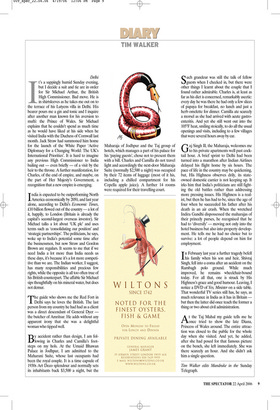Delhi
It’s a sappingly humid Sunday evening, but I decide a suit and tie are in order for Sir Michael Arthur, the British High Commissioner. Bad move. He is in shirtsleeves as he takes me out on to the terrace of his Lutyens villa in Delhi. His bearer pours me a gin and tonic and I inquire after another man known for his aversion to mufti: the Prince of Wales. Sir Michael explains that he couldn’t spend as much time as he would have liked at his side when he visited India with the Duchess of Cornwall last month. Jack Straw had summoned him home for the launch of the White Paper ‘Active Diplomacy for a Changing World: The UK’s International Priorities’. It is hard to imagine any previous High Commissioner to India bailing out — even briefly — of a visit by the heir to the throne. A further manifestation, for Charles, of the end of empire, and maybe, on the part of Her Majesty’s Government, a recognition that a new empire is emerging.
India is expected to be outperforming North America economically by 2050, and last year alone, according to Delhi’s Economic Times, £10 billion flowed out of the country — a lot of it, happily, to London (Britain is already the capital’s second-largest overseas investor). Sir Michael talks a lot about ‘UK plc’ and uses terms such as ‘consolidating our position’ and ‘strategic partnerships’. The politicians, he says, woke up to India’s potential some time after the businessmen, but now Straw and Gordon Brown are regulars. It seems to me that if we need India a lot more than India needs us these days, it’s because it’s a lot more competitive than we are. The Indian worker, I suggest, has many responsibilities and precious few rights, while the opposite is all too often true of his British counterpart. The affable Sir Michael sips thoughtfully on his mineral water, but does not demur.
The guide who shows me the Red Fort in Delhi says he loves the British. The last person from my country he had had as a client was a direct descendant of General Dyer the butcher of Amritsar. He adds without any apparent irony that she was a delightful woman who tipped well.
By accident rather than design, I am following in Charles and Camilla’s footsteps on my hols. At the Umaid Bhawan Palace in Jodhpur, I am admitted to the Maharani Suite, whose last occupants had been the royal couple. It is a time capsule of 1930s Art Deco splendour and normally sets its inhabitants back $3,500 a night, but the Maharaja of Jodhpur and the Taj group of hotels, which manages a part of his palace for his ‘paying guests’, chose not to present them with a bill. Charles and Camilla do not travel light and accordingly the next-door Maharaja Suite (normally $2,500 a night) was occupied by their 72 items of luggage (most of it his, including a chilled compartment for his Copella apple juice). A further 14 rooms were required for their travelling court. Such grandeur was still the talk of fellow guests when I checked in, but there were other things I learnt about the couple that I found rather admirable. Charles is, at least as far as his diet is concerned, remarkably ascetic: every day he was there he had only a few slices of papaya for breakfast, no lunch and just a herb omelette for dinner. Camilla ate scarcely a morsel as she had arrived with acute gastroenteritis. And yet she still went out into the 105°F heat, smiling stoically, to do all the usual openings and visits, including to a few villages that were several hours away by car.
Gaj Singh II, the Maharaja, welcomes me to his private apartments well past cocktail hour. A brief sprint to Delhi had been turned into a marathon after Indian Airlines delayed his flight home by six hours. The pace of life in the country may be quickening, but, His Highness observes drily, its stateowned domestic carrier is not keeping up. It irks him that India’s politicians are still fighting the old battles rather than addressing more pressing issues. His Highness is a realist, but then he has had to be, since the age of four when he succeeded his father after his death in an air crash. When the wretched Indira Gandhi dispossessed the maharajas of their princely purses, he recognised that he had to ‘diversify’ — moving not only into the hotel business but also into property development. He tells me he had no choice but to survive: a lot of people depend on him for employment.
In February last year a further tragedy befell his family when his son and heir, Shivraj Singh, fell into a coma after an accident on the Rambagh polo ground. While much improved, he remains wheelchair-bound today. For all that, one is struck by His Highness’s grace and good humour. Leaving, I notice a DVD of Yes, Minister on a side table. That wonderful TV series still has, he says, as much relevance in India as it has in Britain but then the latter did once teach the former a thing or two about civil administration.
At the Taj Mahal my guide tells me he once tried to show the late Diana, Princess of Wales around. The entire attraction was closed to the public for the whole day when she visited. And yet, he added, after she had posed for that famous picture on the bench, she left immediately. She was there scarcely an hour. And she didn’t ask him a single question.


































































 Previous page
Previous page